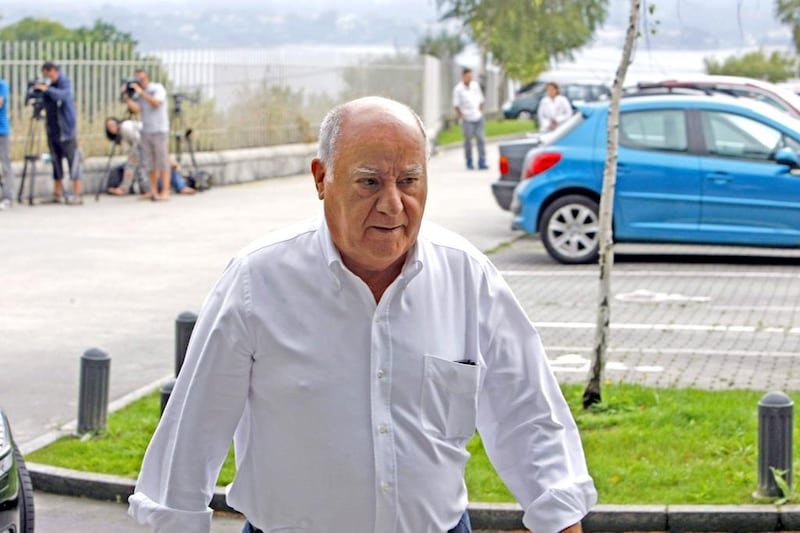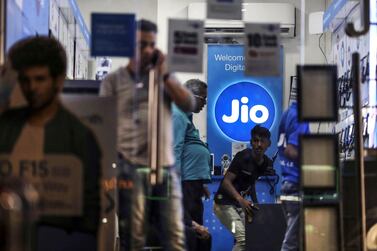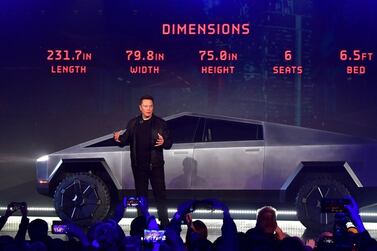Amancio Ortega
After making a fortune in clothing, Amancio Ortega, 84, has turned his attention to property.
The Spanish billionaire’s property holdings have grown to €15.2 billion (Dh63bn), his company revealed, giving him the largest property portfolio among Europe’s super-rich.
Mr Ortega, the founder and owner of fashion label Zara, invested €2.1bn in property last year through various subsidiaries of his holding company Pontegadea, according his company. Pontegadea, which owns 59.3 per cent of Zara parent Inditex, had a net profit of €1.8bn last year, including €1.64bn in Inditex dividends and €621 million from property assets.
Mr Ortega, Spain’s richest man, has diversified his fashion fortune to preserve his sizeable wealth, investing more than $3bn (Dh11bn) in US property in recent years.
Acquisitions include properties such as Manhattan’s historic Haughwout Building and Miami’s tallest office tower. Last year, his investment company completed a $72.5m deal for a hotel in Chicago's city centre, which came after purchases of a building in Washington’s central business district and two Seattle office buildings.
As well as being landlord to technology giants such as Amazon.com and Facebook, Pontegadea also counts Inditex rivals Hennes & Mauritz and Gap as tenants.
The son of a railroad worker, Mr Ortega has a net worth of $58.5bn, according to the Bloomberg Billionaires Index, the bulk of which comes from his majority stake in Inditex. His fortune slumped more than a fifth this year after the coronavirus pandemic, which forced Inditex to close its shops. The company’s shares were down 22 per cent this year, as of last Monday.
Aside from property, Mr Ortega has also invested in energy and telecoms, buying a 5 per cent stake in Enagas last year. In 2018, Pontegadea acquired a 9.99 per cent stake in Telefonica’s tower unit for €378.8m.
Pontegadea said the Covid-19 pandemic may affect its income from rents and dividends this year. It expects to receive €646m in dividends from Inditex in 2020.
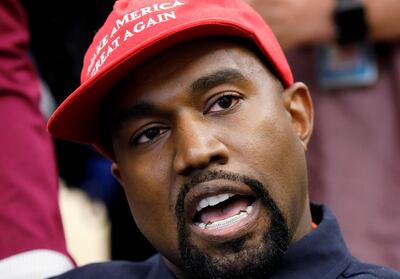
Kanye West
Ventures backed by big-name entertainers Kanye West and Francis Ford Coppola were among those approved for loans under a US government programme to help businesses survive the coronavirus pandemic, according to a list released last Monday.
Billionaire rapper Mr West’s clothing brand Yeezy received clearance for a loan of between $2m and $5m under the Paycheck Protection Programme, the US Small Business Administration said.
The company said the loan would save 160 jobs, according to the SBA.
The PPP was established to help workers at companies and non-profit organisations with fewer than 500 employees that have been hurt by closures and other measures meant to slow the spread of the virus. The list gave the most-detailed accounting to date of who applied for and was approved to receive funds.
Several Hollywood production companies applied for PPP aid after filming was halted in mid-March, putting tens of thousands of cast and crew members out of work. Approved applicants included The Jim Henson Company, creator of the Muppets, and The Apatow Company, run by writer and director Judd Apatow.
A spokeswoman for Mr Apatow said he received $160,000 under the programme but immediately paid it back.
The Jim Henson Company received roughly $2m, which enabled it to keep the entire staff of 75 workers employed, a company spokeswoman said.
Other loan applicants from the world of entertainment included filmmaker Mr Coppola’s Francis Ford Coppola Presents, a lifestyle brand that markets films and other products, and e-sports company FaZe Clan, according to the SBA.
Cinema operators, which were forced to close in March, also applied for relief. Theatre chains approved for loans included Laemmle Theatres and Regency Theatres, which are in California, the government list said.
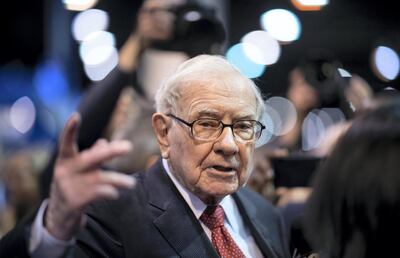
Warren Buffett
Warren Buffett finally made a deal. Berkshire Hathaway said that it is acquiring about $10bn of natural gas assets and associated debt from Dominion Energy.
It may not be the awe-inspiring mega-purchase that his followers have patiently awaited. Still, there is much that can be gleaned from it about Mr Buffett’s frame of mind as the US enters the fifth month of a pandemic that has otherwise kept the famed investor on the sidelines.
This is Berkshire’s biggest acquisition since 2015, yet it is small by Berkshire standards – a relatively low-risk deal in the midst of a recession that’s set to change the outlook for some industries for good.
Even though Mr Buffett recently signalled little appetite to make any big bets so long as the end of Covid-19 remains entirely unknown, energy is one area where he has been poised to make smaller, opportunistic purchases.
During Berkshire’s unusually sombre shareholder meeting in May, he cited the energy division, along with the BNSF railroad and insurance unit, as parts of his conglomerate that were less affected by the virus.
“These businesses will produce cash even though their earnings decline somewhat,” he said.
In his annual letter in February, Mr Buffett wrote of wanting to invest more of the energy unit’s retained earnings to take on large utility projects.
The Dominion deal hands Berkshire about 12,400 kilometres of gas pipelines and 900 billion cubic feet of gas storage. And it comes as Dominion and Duke Energy pull out of plans for a controversial pipeline project along the US East Coast; other similar projects have been scrapped as well, and pipeline stocks have taken a beating.
That confluence of factors created a rare chance in this environment for Mr Buffett to get a deal at a price he likes in an industry he is comfortable with - and at a time when he and seemingly everyone else is scared to do much else. It also happens to be an industry that Mr Buffett’s successor-in-waiting, Greg Abel, knows well as the current head of Berkshire Hathaway Energy.
What stood out as noteworthy in Berkshire’s deal announcement was that the first quote was from Mr Buffett, not Mr Abel. This says that Mr Buffett, who is set to turn 90 next month, is still calling the shots and wants that known. It is also a reminder that Berkshire’s history of striking sweetheart deals with favourable terms is very much because of Mr Buffett’s celebrity and acclaim — there is something to be said for selling your company to the Warren Buffett.
That leaves the question: Will Mr Abel be awarded the same preferential M&A treatment when Mr Buffett’s gone? If not, what will he do with Berkshire’s cash reserves of more than $100bn that not even Mr Buffett has been able to spend?
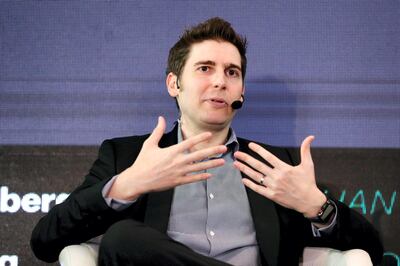
Eduardo Saverin
A venture capital company started by billionaire Facebook co-founder Eduardo Saverin and backed by management consultant Boston Consulting Group has raised $820m for its second fund focused on investing in start-ups.
Mr Saverin says it is important for the start-ups that his company, B Capital, invests in to have an impact on society and to think beyond just their business models.
“Are we worried about what technology can do, both positive and negative? Of course,” he says.
Facebook – in which Mr Saverin still owns a stake worth nearly $12bn, according to data compiled by Bloomberg – has been defending its policies on hate speech as advertisers boycott the social media company and its peers in an attempt to push them to crack down on posts that divide and misinform.
“Facebook and these businesses and social media will try really hard to get it right,” Mr Saverin said. “The spirit is to be value adding to the world.”
Mr Saverin is open to investing in social media-related start-ups, particularly businesses that use chat applications to engage with their customers, he says.
Mr Saverin founded B Capital about five years ago with Raj Ganguly, who used to work at private equity company Bain Capital. The company’s last fund raised $360m in 2018.
B Capital invests in companies in enterprise software, healthcare technology, financial technology and transportation and logistics. It has backed bill-pay service Plastiq and scooter company Bird. It typically invests between $10m and $60m in companies, although Mr Ganguly said the cheque size can be anywhere from $100,000 to $100m.
Mr Saverin, who was born in Brazil and lives in Singapore, said B Capital looks to invest in companies whose technology is used in more than one region. It has offices in Singapore, New York, Los Angeles and San Francisco.
The company’s chairman, Howard Morgan, said it had been doing virtual meetings long before the pandemic forced employees to connect over video conference. “We’ve been on Zoom since 2015,” Mr Morgan said.
Mr Morgan, who cofounded early stage venture capital company, First Round Capital, said now is a good time to invest because prices are lower in an economic downturn – and there could be more opportunities ahead.
“It takes about eight to 12 months for valuations to really start to come down,” he said.
